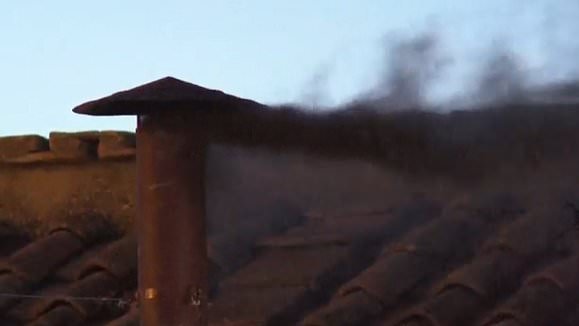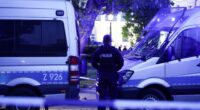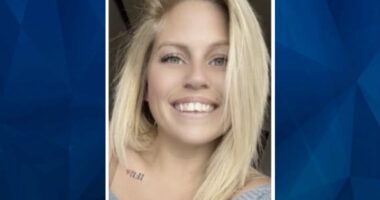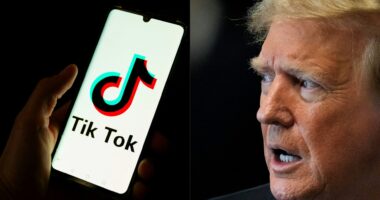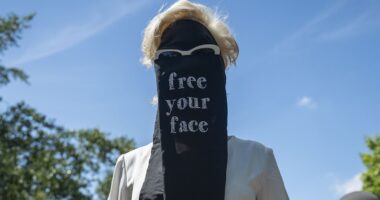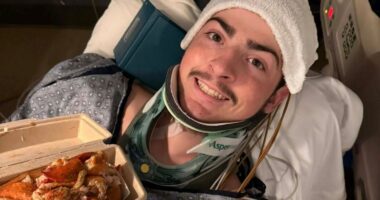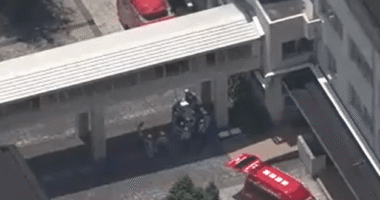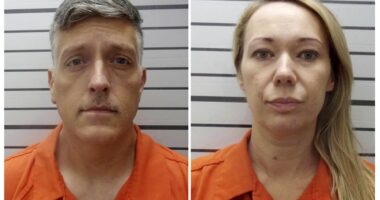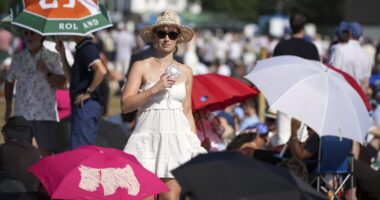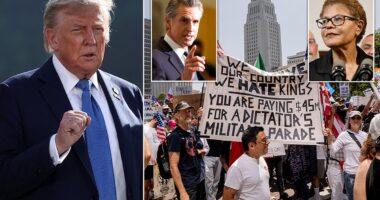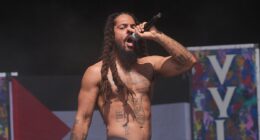Catholic cardinals sent black smoke signals this evening from the Sistine Chapel as the first day of conclave ended without a new pope.
Hailing from 70 different countries, the 133-strong group of cardinals gathered on Wednesday in the Vatican for the centuries-old ritual to elect the 267th pontiff following the death of Pope Francis last month.
Thousands of faithful gathered in St. Peter’s Square waiting for smoke to pour from a narrow flue on the roof at the end of a day rich in ritual and pageantry.
Groans went up from the crowd as the dark plume comes from burning of the ballot papers and chemicals are added to enhance the tone but once a Pope is chosen it will be white smoke from the chimney.
Black smoke signifies that no-one achieved the required two-thirds majority, and voting will resume tomorrow.
The cardinals have now retired for the night and will return Thursday morning.
Up to four votes a day can take place from then, two in the morning and two in the afternoon, with white smoke confirming a new pope has been chosen.
It was unlikely that the cardinals would come to a consensus with the first vote today, given that previous elections have taken a number of days.
The longest conclave in history was almost three years, when Pope Gregory X was elected.
The shortest lasted just 10 hours and ended with the election of Pope Julius II in 1503.

Catholic cardinals sent black smoke signals this evening from the Sistine Chapel as the first day of conclave ended without a new pope

Black smoke rises from the chimney on the Sistine Chapel, indicating no decision has been made to elect a new pope, at the Vatican, May 7, 2025

People gather in St. Peter’s Square on the first day of the conclave to elect the next pope, Vatican City, 07 May 2025
In recent history the next leader of the Catholic Church is usually elected within two or three days.
There are three UK cardinals taking part in conclave – Cardinal Vincent Nichols, Cardinal Timothy Radcliffe and Rome-based Cardinal Arthur Roche.
Cardinal Nichols had called on people to pray for himself and other cardinals as they embark on the secret voting process, adding that he feels ‘quite intimidated’ knowing the world is watching to see who they choose.
The voting cardinals – those aged under 80 who are the only ones eligible to cast a ballot – were urged to ‘invoke the help of the Holy Spirit’ to help them elect a pope ‘whom the Church and humanity need at this difficult and complex turning point in history’.
The current front-runner is thought to be Cardinal Luis Antonio Tagle, 67, from the Philippines, who would be the first Asian pope.
Pietro Parolin, the current secretary of state for the Vatican, is also considered to be a leading candidate.
Matteo Zuppi, Fridolin Ambongo Besungu, Peter Erdo, Pierbattista Pizzaballa, Peter Turkson, Jean-Marc Aveline and Anders Arborelius are also top contenders.
Francis named 108 of the 133 ‘princes of the church,’ choosing many pastors in his image from far-flung countries like Mongolia, Sweden and Tonga that had never had a cardinal before.

This photo taken and handout on May 7, 2025 by The Vatican Media shows cardinals during a holy mass for the Election of the Roman Pontiff, prior to the start of the conclave, at St Peter’s Basilica in The Vatican

The chimney atop the roof of the Sistine Chapel during the conclave to elect a new pope, at the Vatican, Wednesday, May 7, 2025

People gather in St Peter’s Square in anticipation of a new pope as Cardinals begin their conclave to elect new Pope on May 7, 2025 in Vatican City

Cardinal Luis Antonio Tagle is a frontrunner this time round and is considered one of the more liberal candidates

Cardinal Turkson, born in Ghana, was the bookies’ favourite at one point when Francis was chosen in 2013. He would be the first black pope

Parolin has worked closely with Pope Francis but has upset some with his views on China

From the Eastern bloc, Erdo is a deep conservative and has spoken against divorced or remarried Catholics receiving holy communion
His decision to surpass the usual limit of 120 cardinal electors and include younger ones from the ‘global south’ — often marginalized countries with lower economic clout — has injected an unusual degree of uncertainty in a process that is always full of mystery and suspense.
Many cardinals hadn’t met until last week and lamented they needed more time to get to know one another, raising questions about how long it might take for one man to secure the two-thirds majority, or 89 ballots, necessary to become the 267th pope.
Addressing cardinals in St Peter’s Basilica, Cardinal Giovanni Battista Re said: ‘To pray, by invoking the Holy Spirit, is the only right and proper attitude to take as the cardinal electors prepare to undertake an act of the highest human and ecclesial responsibility and to make a choice of exceptional importance.
‘This is a human act for which every personal consideration must be set aside, keeping in mind and heart only the God of Jesus Christ and the good of the Church and of humanity.’
The pontiff – believed to be someone called to be the successor to St Peter, who was the first pope – will need to be a person who can ‘awaken the consciences of all and the moral and spiritual energies in today’s society, characterised by great technological progress but which tends to forget God’, Cardinal Battista Re added.

Hailing from 70 different countries, the 133-strong group of cardinals gathered in the Vatican for the centuries old-ritual to elect the 267th pontiff following the death of Pope Francis

A nun waits for the smoke to rise from the chimney

The pontiff – believed to be someone called to be the successor to St Peter, who was the first pope – will need to be a person who can ‘awaken the consciences of all and the moral and spiritual energies in today’s society, characterised by great technological progress but which tends to forget God’, Cardinal Battista Re said

In recent history the next leader of the Catholic Church is usually elected within two or three days

Francis named 108 of the 133 ‘princes of the church,’ choosing many pastors in his image from far-flung countries like Mongolia, Sweden and Tonga that had never had a cardinal before

A faithful cries while praying as he waits for the smoke to rise from the chimney on the Sistine Chapel

Pilgrims arrive during the cardinals’ conclave to elect a new pope, at the Vatican, Wednesday, May 7, 2025

Visitors queue for security checks under the colonnade to enter The Vatican’s St Peter’s Square during the conclave, in Rome, on May 7

Faithful watch a giant screen showing images of cardinals entering the conclave in Sistine Chapel to elect a new pope

Black smoke signifies that no-one achieved the required two-thirds majority, and voting will resume tomorrow

The security measures at the Vatican City has included the ‘shielding’ of the mobile network and data throughout the City State, to prevent the cardinal electors from coming into contact with the outside world

A screen grab taken from a video released by the Vatican Media shows the cardinal electors leaving the Pauline Chapel
He said a new pope must foster a sense of communion – ‘communion of all Christians with Christ; communion of the Bishops with the Pope; communion of the Bishops among themselves’.
He added: ‘This is not a self-referential communion, but one that is entirely directed towards communion among persons, peoples and cultures, with a concern that the Church should always be a ‘home and school of communion’.
While the cardinals are supposed to resist any ‘secular’ influences in their choice, such lobbying abounded in Rome in the days before the conclave as various groups reminded cardinals of what ordinary Catholics want in a leader.
Young Catholics penned an open letter reminding cardinals that there is no church without young people, women and the laity.
Conservative Catholic media slipped cardinals copies of a glossy book containing their assessments of contenders.
Survivors of clergy sexual abuse warned cardinals that they would be held accountable if they failed to find a leader who will crack down on decades of abuse and cover-up.
Advocates for women’s ordination sent pink smoke signals Wednesday over the Vatican to demand that women be allowed to be priests and participate in a conclave.

Cardinals attend a mass for the election of the Roman Pontiff, prior to the start of the conclave

Clergy members wait for the smoke to rise

Since Francis chose 80% of the voters, continuity is likely, but the form it might take is uncertain and identifying front-runners has been a challenge

A faithful prays with a rosary as he waits for the smoke to rise from the chimney on the Sistine Chapel
Many challenges face the new pope and weigh on the cardinals — above all whether to continue and consolidate Francis’ progressive legacy on promoting women, LGBTQ+ acceptance, the environment and migrants, or roll it back to try to unify a church that became more polarized during his pontificate. The clergy sex abuse scandal hung over the pre-conclave talks.
Since Francis chose 80% of the voters, continuity is likely, but the form it might take is uncertain and identifying front-runners has been a challenge.
But some names keep appearing on lists of ‘papabile,’ or cardinals having the qualities to be pope, in addition to Parolin.
